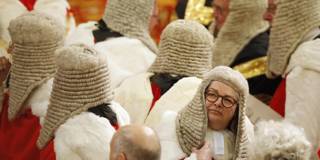Contrary to the assurances of Brexiteers like the United Kingdom’s new prime minister, withdrawing from the European Union has turned out to be an extraordinarily complicated affair. In fact, it will probably require the UK to draft a standalone constitution for the first time in its history.
LONDON – Britain’s constitution is not “unwritten,” as one often hears. It is, rather, uncodified – written down, but not all in one place. And to its credit, it has proven resilient time and again, sometimes bending, sometimes buckling, but never breaking. Yet that may soon change, for the Brexit debate is testing the constitution’s limits like never before.
Britain’s constitutional framework was conceived during the Glorious Revolution of 1688, when fear of an impending Catholic tyranny led Parliament to invite Mary II and William III to displace James II on the British throne. This bloodless revolution was conducted with the clear understanding that the monarch would no longer reign supreme. Britain became a constitutional monarchy, with statutes such as the Bill of Rights establishing a new lodestar of parliamentary sovereignty.
From then on, the British constitution developed relatively peaceably, sheltered as it was from the waves of revolution that stormed across Europe in the intervening centuries. Indeed, the United Kingdom’s accession to the European Economic Community (EEC) in 1973 was arguably Britain’s first constitutional revolution since 1688. The sovereignty of Parliament – a lynchpin of the constitution – was displaced, with authority passing across the English Channel to the European Commission in Brussels.

LONDON – Britain’s constitution is not “unwritten,” as one often hears. It is, rather, uncodified – written down, but not all in one place. And to its credit, it has proven resilient time and again, sometimes bending, sometimes buckling, but never breaking. Yet that may soon change, for the Brexit debate is testing the constitution’s limits like never before.
Britain’s constitutional framework was conceived during the Glorious Revolution of 1688, when fear of an impending Catholic tyranny led Parliament to invite Mary II and William III to displace James II on the British throne. This bloodless revolution was conducted with the clear understanding that the monarch would no longer reign supreme. Britain became a constitutional monarchy, with statutes such as the Bill of Rights establishing a new lodestar of parliamentary sovereignty.
From then on, the British constitution developed relatively peaceably, sheltered as it was from the waves of revolution that stormed across Europe in the intervening centuries. Indeed, the United Kingdom’s accession to the European Economic Community (EEC) in 1973 was arguably Britain’s first constitutional revolution since 1688. The sovereignty of Parliament – a lynchpin of the constitution – was displaced, with authority passing across the English Channel to the European Commission in Brussels.